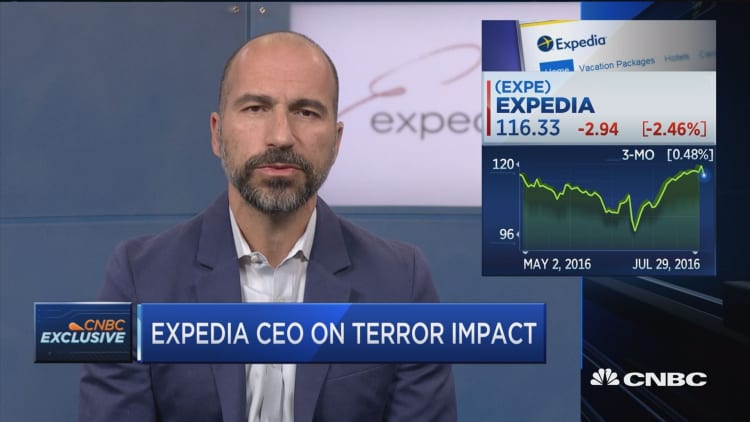
FRANKFURT — Three blocks from Frankfurt's main train station, travel agent Hari Singh answered a flurry of phone calls from German and international clients.
Sitting behind a wooden desk at the office of Bobby's Travel Reisebüro, Singh was calm and relaxed as he booked airfare, hotels or vacation packages across Europe. But Europe, he said, is on edge.
"Across Europe, there is a big concern about security, so people are moving their travel destinations," Singh said.
He said European travelers became increasingly worried about safety after deadly attacks in Paris last November left 130 innocent people dead. Since then, a slew of horrific terror incidents in Belgium, Turkey, France and Germany have further heightened travelers' fears. For now, some of Singh's clients are shifting trips to countries like Spain or Portugal, which haven't had major terror attacks in the last few years.
Gauges of consumer confidence typically slide in the weeks or months after terror incidents, only to rebound soon after. Now, the frequency of the recent attacks in Germany and France is making some businesses consider whether there will be a longer-term economic impact.
But people including Singh are not concerned yet that travelers will stop calling altogether. And he's not alone.
In its most recent earnings call, online travel company Expedia said when isolated terrorist attacks occur, it usually sees an immediate reduction in bookings and an increase in cancellations for the impacted destination. The company reported that demand is typically diverted to other destinations, and, over time, normal travel patterns resume.
"Though we are hopeful to see the same patterns repeat themselves, the frequency of recent events is giving us reason to be incrementally cautious," the company's CFO, Mark Okerstrom, said on the call.
Jacob Funk Kirkegaard, senior fellow at the Peterson Institute for International Economics, cautioned that the regularity of violence across Germany and France, two of the euro zone's largest economies, may prove particularly unnerving to consumers. In the last month, the countries have seen a man wielding an ax on a train in southern Germany, a shooting at a shopping mall in Munich and more than 80 people killed in Nice, France, by a terrorist who targeted pedestrians.
"It's clear that the increased frequency of attacks that we've seen over the summer and also the sort of remarkable randomness of the attacks runs the risk that consumers, based on previous incidents, seem to decide to stay at home," Kirkegaard said.
He said shoppers will continue to purchase durable goods such as washing machines or other appliances, but they might think twice before going out for leisure. Significant price cuts by restaurants, hotels or other major businesses could signal a broader consumer downturn.
"A longer-term slowdown in European consumers, particularly in Germany, could have damaging impacts on the EU economy," Kirkegaard said.
Unfortunately, France has suffered several terrorist incidents since the start of 2015 and, the more frequent they become, the weaker the impact of each attack is likely to be.Diego Iscarosenior economist, IHS Global Insight
Many experts say consumers have yet to reach that threshold. In the wake of the Brussels attacks in March, the National Bank of Belgium's consumer confidence indicator dipped for two months before stabilizing. Data from household confidence surveys in France remained steady in the immediate months after the Paris terrorist attacks last November.
"If we stick to what the survey data are telling us, consumer sentiment and business sentiment have been pretty resilient," said Claus Vistesen, chief eurozone economist at Pantheon Macroeconomics.
Diego Iscaro, senior economist at IHS Global Insight, said he does not expect the deadly attack in Nice to create a long-lasting drop in confidence — in part because of the frequency of terror incidents across the country.
"Unfortunately, France has suffered several terrorist incidents since the start of 2015 and, the more frequent they become, the weaker the impact of each attack is likely to be," Iscaro said. "Having said that, the combination of the terrorist attack in Nice and the Brexit vote in the U.K. is expected to have a temporary, but modest, impact on consumer confidence."
But even a temporary shock to sentiment can hurt business. German airline Lufthansa cited terrorism as a key reason why it expected unit revenues to decrease "very significantly in the months ahead."
"Advance bookings, especially on long-haul routes to Europe, has declined significantly due to the repeated terrorist attacks in Europe and also due to the grown political and economic uncertainty," Lufthansa's chief financial and aviation services officer, Simone Menne, said on the company's earnings call last week.
British budget airline easyJet, which primarily operates flights between countries in Europe, also warned about the recent attacks saying in a company release in June, "The economic and operating environment remains uncertain, following the high levels of disruption and more recently the U.K.'s referendum decision to leave the EU, as well as the recent events in Turkey and Nice, which have affected consumer confidence."
Singh, the Frankfurt-based travel agent, said the recent attack in Munich isn't stopping him from encouraging trips to the annual Oktoberfest festival next month. An estimated 6 million other Germans and tourists will join him there, according to the official website.
"I'm going, and I'm not worried," he said.


